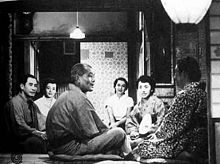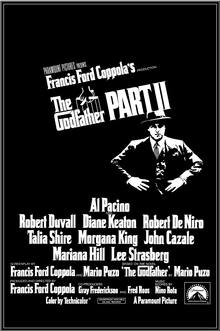
The Godfather Part II is a 1974 American epic crime film. The film is produced and directed by Francis Ford Coppola, loosely based on the 1969 novel The Godfather by Mario Puzo, who co-wrote the screenplay with Coppola. It is both a sequel and a prequel to the 1972 film The Godfather, presenting parallel dramas: one picks up the 1958 story of Michael Corleone, the new Don of the Corleone family, protecting the family business in the aftermath of an attempt on his life; the prequel covers the journey of his father, Vito Corleone, from his Sicilian childhood to the founding of his family enterprise in New York City. The ensemble cast also features Robert Duvall, Diane Keaton, Talia Shire, Morgana King, John Cazale, Mariana Hill, and Lee Strasberg.
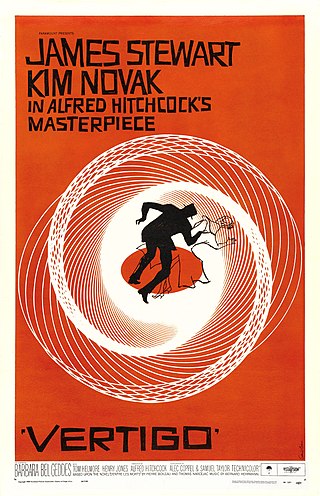
Vertigo is a 1958 American psychological thriller film directed and produced by Alfred Hitchcock. The story was based on the 1954 novel D'entre les morts by Boileau-Narcejac. The screenplay was written by Alec Coppel and Samuel A. Taylor. The film stars James Stewart as former police detective John "Scottie" Ferguson, who has retired because an incident in the line of duty has caused him to develop acrophobia accompanied by vertigo, a false sense of rotational movement. Scottie is hired by an acquaintance, Gavin Elster, as a private investigator to follow Gavin's wife, Madeleine, who is behaving strangely.

Battleship Potemkin, sometimes rendered as Battleship Potyomkin, is a 1925 Soviet silent epic film produced by Mosfilm. Directed and co-written by Sergei Eisenstein, it presents a dramatization of the mutiny that occurred in 1905 when the crew of the Russian battleship Potemkin rebelled against its officers.
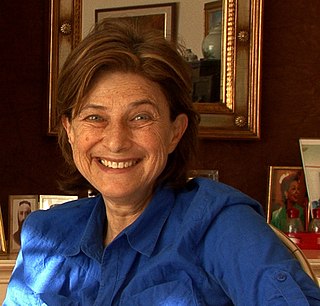
Chantal Anne Akerman was a Belgian film director, screenwriter, artist, and film professor at the City College of New York.
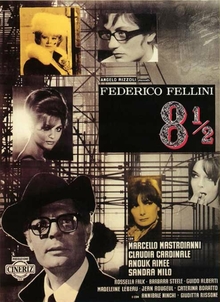
8+1⁄2 is a 1963 Italian surrealist psychological comedy-drama film directed and co-written by Federico Fellini. The metafictional narrative centers on Guido Anselmi,, a famous Italian film director who suffers from stifled creativity as he attempts to direct an epic science fiction film. Claudia Cardinale, Anouk Aimée, Sandra Milo, Rossella Falk, Barbara Steele, and Eddra Gale portray the various women in Guido's life. The film is shot in black and white by cinematographer Gianni Di Venanzo and features a score by Nino Rota, with costume and set designs by Piero Gherardi.

The Apu Trilogy comprises three Indian Bengali-language drama films directed by Satyajit Ray: Pather Panchali (1955), Aparajito (1956) and The World of Apu (1959). The original music for the films was composed by Ravi Shankar.
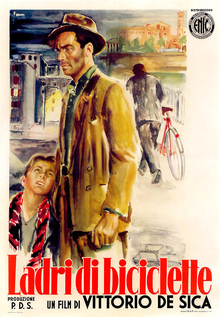
Bicycle Thieves, also known as The Bicycle Thief, is a 1948 Italian neorealist drama film directed by Vittorio De Sica. It follows the story of a poor father searching in post-World War II Rome for his stolen bicycle, without which he will lose the job which was to be the salvation of his young family.

Tokyo Story is a 1953 Japanese drama film directed by Yasujirō Ozu and starring Chishū Ryū and Chieko Higashiyama, about an aging couple who travel to Tokyo to visit their grown children.

David Thomson is a British film critic and historian based in the United States, and the author of more than 20 books.

Close-Up is a 1990 Iranian docufiction written, directed and edited by Abbas Kiarostami. The film tells the story of the real-life trial of a man who impersonated film-maker Mohsen Makhmalbaf, conning a family into believing they would star in his new film. It features the people involved, acting as themselves. A film about human identity, it helped to increase recognition of Kiarostami internationally.

Jeanne Dielman, 23 quai du Commerce, 1080 Bruxelles is a 1975 film written and directed by Belgian filmmaker Chantal Akerman. It was filmed over five weeks on location in Brussels, and financed through a $120,000 grant awarded by the Belgian government. Distinguished by its restrained pace, long takes, and static camerawork, the film is a slice-of-life depiction of a widowed housewife over the course of three days.
Godfrey Cheshire III is an American film critic, film writer and director.

Faouzi Bensaïdi is a Moroccan film director, actor, screenwriter and artist. His film A Thousand Months was screened in the Un Certain Regard section at the 2003 Cannes Film Festival.
Nigel Andrews FRSA is a British film critic best known for being the long-time chief film critic of the Financial Times.
The Sight & Sound Greatest Films of All Time 2012 was a worldwide opinion poll conducted by Sight & Sound and published in the magazine's September 2012 issue. Sight & Sound, published by the British Film Institute, has conducted a poll of the greatest films every 10 years since 1952.
Geoff Andrew is a British writer and lecturer on film, and currently Programmer-at-large at BFI Southbank. Born in Northampton, he studied at Northampton Grammar School and went on to gain a First in Classics at King's College, Cambridge. Andrew was for some years a programmer at London's Electric Cinema in Notting Hill, and later became the editor and chief critic of the film section of Time Out magazine. In 1999, he was appointed Programmer of London's National Film Theatre.
Modernist film is related to the art and philosophy of modernism.
The "Top 100 Greatest Films of All Time" is a list published every ten years by Sight and Sound according to worldwide opinion polls they conduct. They published the critics' list, based on 1,639 participating critics, programmers, curators, archivists and academics, and the directors' list, based on 480 directors and filmmakers. Sight and Sound, published by the British Film Institute, has conducted a poll of the greatest films every 10 years since 1952.

Citizen Kane is a 1941 American drama film directed by, produced by, and starring Orson Welles. Welles and Herman J. Mankiewicz wrote the screenplay. Citizen Kane is frequently cited as the greatest film ever made.



